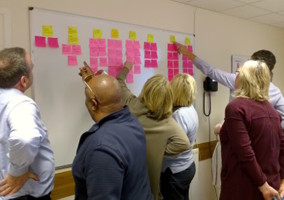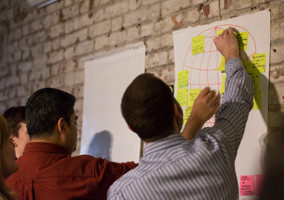Over the last two years, the Law Centres Network (LCN) has been working with Law Centres to explore how and what digital tools could help them extend the reach of their available resources and better work within their communities. This has been driven by the combined impact of legal aid reform, 40 per cent funding cuts and the rise in the need for Law Centre assistance driven by a stringent government programme of withdrawal of services. On top of this, the court service is being digitised so that much of the necessary interaction with courts will only be done online.
It is years since many Law Centres have had funds to spend on their infrastructure so we soon realised that as well developing some tools, we had to upgrade their kit. We embarked on a project to upgrade the essentials – migration to the Cloud, training in new software tools, upgrading the fundamental hardware - however, our interest was soon captured by the exciting offerings of CAST.
Julie Bishop, LCN director, took part in the Digital Fellowship, CAST’s learning programme for nonprofit leaders. This not only provided expert training on digital methodologies and tools, but also included the opportunity to develop one of the tools we had identified – a means of collecting more real time data from centres. We realised that instead of collecting multiple screens of carefully refined data, collecting a few key pieces of current data would be more useful to LCN. The digital tool that we developed through the Fellowship makes it easy for centres to report and feed back what’s happening on the ground as frequently as they can, e.g. that they saw twelve people needing food this week. With this type of intelligence LCN can respond to issues as they arise and have the data needed to develop responsive national projects. The user focused design and iterative approach and has meant we have had very positive feedback from our Centres and that they are keen to help develop it.
Our second experience with CAST was taking part in their 12-week tech accelerator, Fuse, which focused on diving into a problem area and at the end of the 12 weeks, coming out with a specific tool. The problem area we looked at was how we might help Law Centres manage demand so that all clients receive a service which is best suited to their needs. We spent the first four weeks doing intensive research into this area by spending time in five different centres, really understanding their needs and identifying exactly where digital would help and where it would not.
Using digital for communication
We soon learnt that the area where digital would help Law Centres the most was in communication with their clients. We identified, through user-led research that developing a SMS messaging tool could be very useful for appointment management, to make sure people do not miss appointments and that they arrive with necessary documents, but also for communicating with clients about their on-going cases. This was a surprise because it was not what we envisaged when we first set out on Fuse – we thought that we would focus on developing an intelligent triage tool or something in this area. It just goes to show, it is crucial that development be user-led and that simple solutions can be the most effective.
The whole process was a massive learning for us and in particular we learnt to involve users as early as possible and not to be attached to a certain solution but focus on what you are being told, what actually works for them and what is most needed. This was quite different to other projects we have embarked on where we have mapped the whole process out before we started. It was also great to learn different ways of approaching the problem – we learnt various different working methods from the CAST team and loved the varied and flexible approach they had, something we will certainly be taking away with us and implementing on other projects, not just digital ones.
The whole project very much felt like a collaboration between CAST and LCN, but also between the various members of the LCN team and the Law Centres involved - that in itself was a brilliant experience.
It was fantastic that even during the three-month accelerator our centres were able to use the tool that we had created and that the feedback was so positive. It was certainly something to win over some of the more sceptical users. Looking forward however, this is where we are really excited – we are carrying out a three-month pilot after summer and will fine tune the tool and tailor some of the more complex functions based on the feedback from our users. Once happy the tool is robust enough, we will roll this out to our entire network and potentially even other charities. Developing this tool has encouraged us to dedicate more resources to extending digital across the network and shown us the importance of investing in the essentials, so our centres can access tools such as these.
For any charity starting out, we would advise taking the time to think how you can incorporate and maximise digital from the outset as it will only pay off in the long run. In particular, the design principles created by CAST are an amazing place to start – all the really hard work has been done for you.
All round we have had such positive experiences.
|
Related articles











